Supplying the front lines: Masha the aid volunteer
Medicines, clothes, blankets, tourniquets, bandages, food - all for the victory
This is Masha and she’s just as determined and together as she looks. She works as a fixer/supply sourcer/translator/driver alongside my friend Jack, so in view of the density of the Masha population in Ukraine (I personally know three), she’s known as Jack’s Masha1.
I arranged to meet with her and interview her in a nice quiet coffee shop… But as soon as she turned up, it got busy. Cue roaring coffee machine. So we repaired to Kharkiv central park, which comes complete with a currently free zoo containing leopards, tigers, giraffes, the lot.
There, the desperate chase began. More of that later.
To start with, we sat down on a nice quiet bench and I asked Masha how she met Jack.
Masha: I first met Jack when I was asked to help him as a translator. I immediately said, my English is poor, very poor! But clearly there was no choice, Jack needed help, so we met up, tried to communicate and somehow established a basic level of understanding.
So I was going to help him as a translator, then I saw he supplies soldiers with items they request, and I started to help him with that. When we visit civilians, I talk to them, but sadly I can’t fully translate. I tell him the basics, what he needs to know and what will interest him.
Meanwhile… the wind picks up.
Can you give me example of how you manage? At checkpoints, for example.
We were going to some civilians in a village. We got to a checkpoint and the soliers said, the road is closed. Jack began to act it out, I need to get there immediately, then talking in English, knowing they wouldn’t understand him, and hoping they would let him through. He implied to me that I needed to lie to them and I said, no, Jack, I’m not going to lie! Because I’m the responsible person here! It’s my documents they’re photographing.
They didn’t let us through. So Jack said we would take a different road. We picked a road that was three times longer than the other one. There wasn’t a single car or person on it. Completely deserted, and on either side there were trenches, dugouts, defence lines. The road was very bad, there was no mobile signal and I was very afraid that if something happened, if the car broke down on the way, nobody would ever find us.
How often do you go on missions?
I started working with Jack in October 2023, and in the first six months we went out once a week minimum. Now we go out less often because we need money for fuel, and time to find the supplies. Once or twice a month.
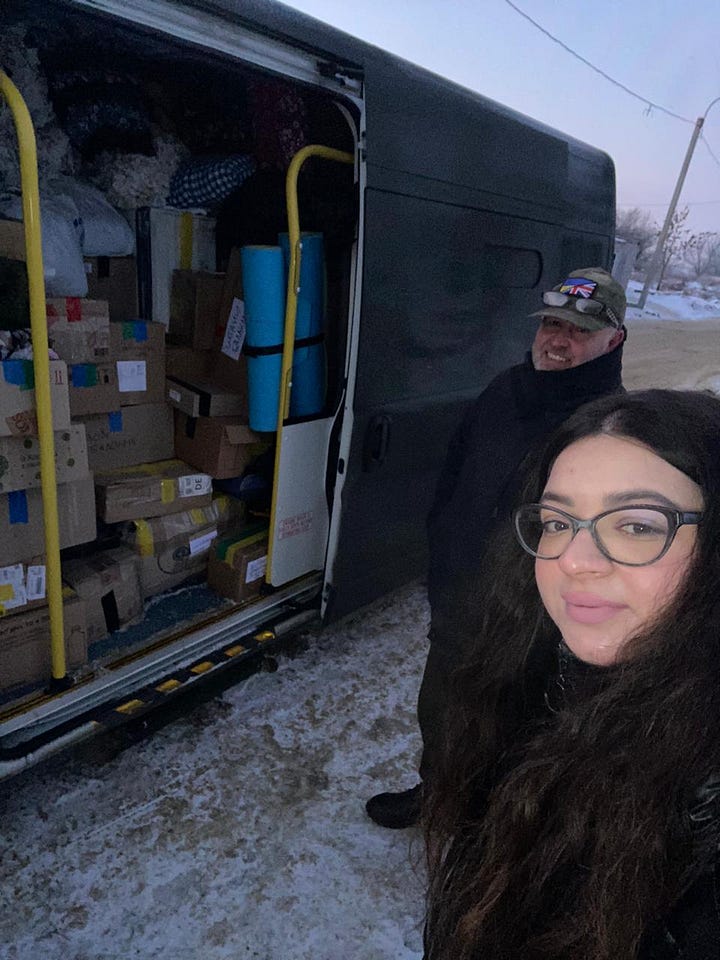

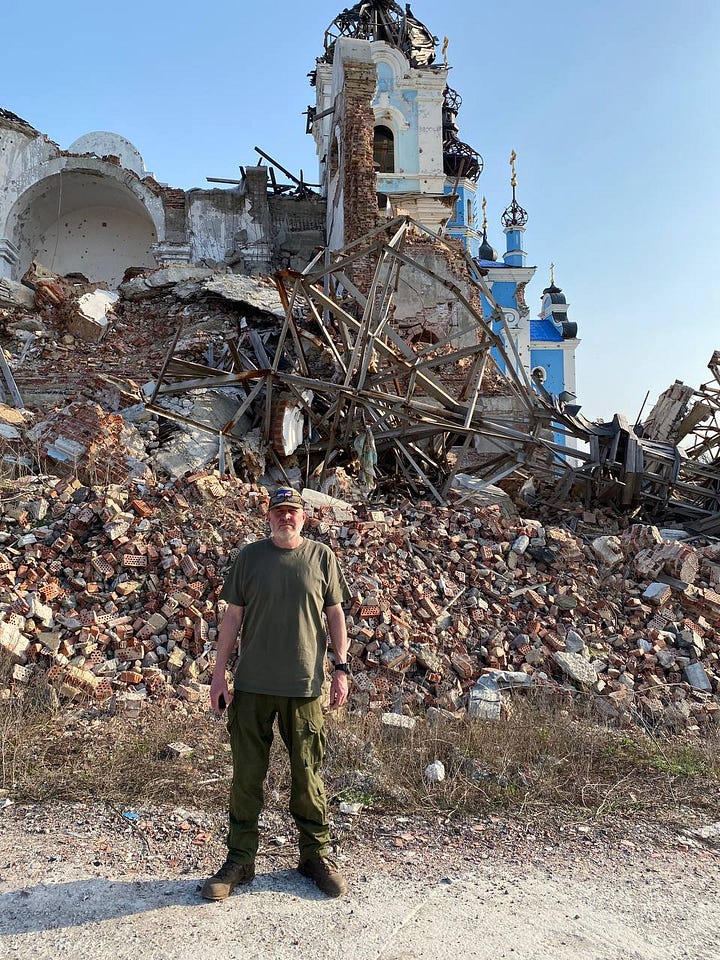
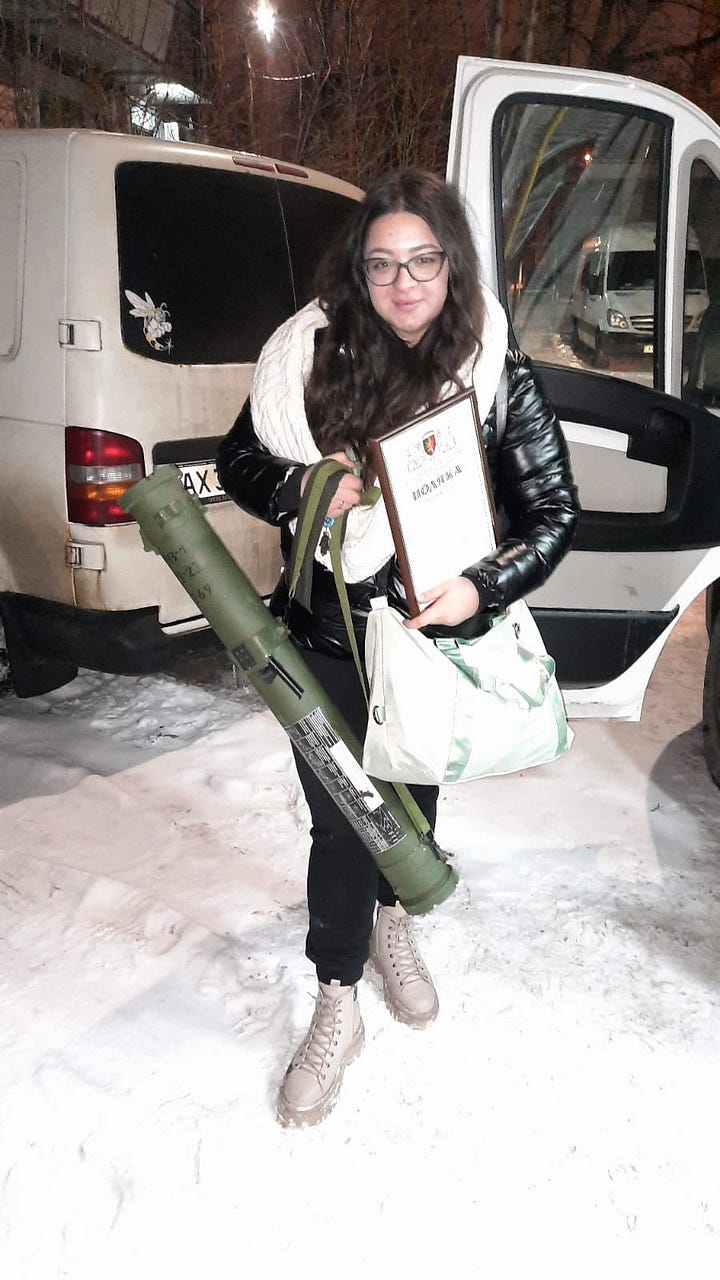
You can support Masha and Jack’s work by donating here.
FZZZZZZZZRRT! The wind in the park is really picking up and blustering on the recording. But we stay put…
What kind of supplies do you take?
We take medicines, clothes for the wounded, tourniquets and bandages to soldiers and combat medics and stabilisation points [Anna’s note: Wounded soldiers are extracted from the front lines by combat medics, and taken first to stabilisation points, which are just a couple of km away, so pretty dangerous in themselves. After their condition is stabilised, they are driven on to hospital. They may need new clothes as their uniforms are cut off as part of emergency treatment.] Right now we try to get medicine for free, as humanitarian help from other countries. Things that aren’t included, we collect money to buy. We take everything we are asked for.
You help civilians too?
We take them clothes and blankets, and the Ukrainian Church shares with us food they collect. Before every trip we ask soldiers and civilians what they need, and they tell us, and we have time to find it – buy it or find it for free – and prepare it. We never take unnecessary things. Only essentials. We don’t work for the sake of photo reports! [Anna’s note: It’s a common grumble in the volunteer community that some people do this.] The most important thing for us is to take what we’re asked for.
FRARRRRRRRFFFFRGGGGGGGG! A guy with a strimmer has appeared cutting back vegetation in the untenanted animal enclosure 20 yards away.
Do missions get scary?
It’s all relative. I’m used to my fear, I try to be objective in that situation. And during trips we’ve never had arrivals nearby. But you know, on the road we constantly hear arrivals. We have to work out whether it’s outgoing fire or arrivals, and how near it is, but we’re ready to act, and we’re careful.
What kind of civilians are still living in villages near the front lines?
Ordinary Ukrainians who have worked and built their homes there all their lives. They have no other place to go so they want to to remain to the last and place their hopes in our army.
About 90%, 95% have left the areas near the frontline. Our government has imposed compulsory evacuations for children. Most of the adults left are elderly, grandmas and granddads who don’t want to leave in their old age.
FRARRRRRRRFFFFRGGGGGGGRRFFRRRRRRRRRRT!
OK, OK, the strimmer has won. Time to move on…
Moving on to you, I guess you have to do paid work as well as volunteer?
Of course. I’m a sales manager. My bosses let me work remotely, so I take my laptop on all our trips and if I’m not needed, I work in the car. There I am, near the front, working on my laptop, because it’s essential if I’m to make enough money for my own life. And money is essential, for donations, for petrol, for heating the car, for repairing it; doing this takes a lot of money.


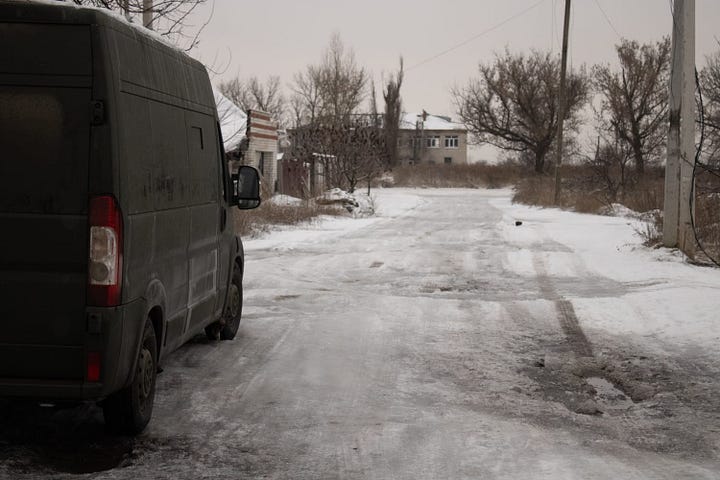

After a short interlude admiring meerkats, we find the shady lee of a cafe…
Jack said you’ve been volunteering for ten years.
When the war started, I was 15. Still at school. So of course I couldn’t do volunteer work the way I do now. But even then we went to rallies, all the ones that took place in Kharkiv, from the very start of the Revolution of Dignity [February 2014]. Then when the occupation of Donbas began [April 2014] my friends and I collected help for the military, as much as we could.
We were children but we did everything we could. It was very offensive to see how around you adults were doing nothing. You were a child, sitting in a lesson at school, watching videos of how our prisoners of war were being abused; you were crying and realising that the adults around you were indifferent [Masha’s voice wobbles]. You try to do everything a child can, but you can do nothing.
And adults continue to be inactive now?
Well, people are very different. There’s the active part of the population and the passive part. There are a lot of people who think to this day that the state should do everything, and the Russians can attack whoever they like, but won’t kill them. There’s a Ukrainian phrase, My house isn’t at risk, meaning something isn’t your business. I like to say to people who do nothing: Your house is at risk! Your house will be next!
Very few people donate. They find money for holidays, for travel, for buying new tech, but they don’t find money to support the army. This is a big mistake, because all the stuff you’re buying now could be destroyed by a Russian rocket tomorrow.
They’re getting inured?
Well, we have no choice but to get used to the situation, because it takes a rocket one minute to get here from Russia. Even our air defence can’t shoot them down. All we can do is hide in the corridor, use the rule of two walls [One takes the blast, the other the shrapnel]. There are shelters, there’s the metro. But often there’s no point going because the rocket moves faster than you can get to the shelter.
Have you ever wanted to leave Kharkiv?
At the very start of the full-scale invasion, 70% of the population left. Now a lot of people have come back.
For the first ten days, we lived in the cellar, the whole family. We left because of the fighter planes. They were bombing houses and apartment blocks every day. Planes are the worst sound, the worst destruction, and if it wasn’t for them we might have stayed here longer.
We left Kharkiv for three months, then came back in May 2022. That was another very difficult period in Kharkiv, because in the course of four months absolutely every day, absolutely every day and night [Masha’s voice is shaking], the Russians attacked Kharkiv with between three and seventeen missiles. Every day. Absolutely. Without fail, for four months. They did this completely indiscriminately. They launched them at apartment blocks, at ordinary houses; there were no military targets. They wanted to terrorise the population.
We knew that every air raid siren would end with an arrival. And it wouldn’t be one rocket, or two, but sometimes a lot. Ten, fifteen, sixteen, seventeen rockets. You heard every one and didn’t know whether the next one would come your way or not. And you knew if you were lucky that time, someone else had been unlucky.
Every night we heard the sound of the alarms, and we went into the corridor like zombies and lay down to sleep there. One of the signs that the Russians were engaging in a deliberate campaign of terror against the population of Kharkiv was that they did it at the same time every night. We knew that at first there would always be rockets at 2300 and 0300. Then they changed the timetable. It was at 0200. And we knew, it’s 0200, it’s time for rockets. Then 0400 would be the time for rockets. They taught us this life, and it was maybe more psychologically difficult than the first months when they were hitting us with artillery. Because artillery is smaller than rockets.
The wind is picking up still more and the café door nearby bangs wildly… But as has been shown, Masha has braved rather worse than that so we continue undaunted…
Do you have relatives at the front?
My parents and my husband aren’t fighting at the moment, but they are ready to go if they are called up. My uncle is fighting and some other relatives – it’s a big family! I have a lot of friends in the army.
What would you like people to know about the current situation in Kharkiv?
There’s lots of people. We’re sitting in a zoo park right now, mums are strolling around with kids, and life is going on regardless of the Russians trying to turn Kharkiv into another Mariupol. Kharkiv is a very big city, with one million people, and the loss of it would be a very big deal for the country.
We were completely surrounded by Russian troops, but our army saved us, they pushed them back. We are very grateful to our army, because life under Russian occupation is very bad. I’d be very scared to stay in Kharkiv. I’ve been volunteering since 2014, and if they were to find me they’d first torture me and then kill me. That’s why I didn’t want to stay here [in February 2022]. Unfortunately my parents took a long time to understand that; but now they say that if there’s a threat, they’ll leave. But I don’t know… I’m not ready yet!
The weather gods want us to finish there!!
Because right then, the heavens open! We hurry towards the car…
The heavens roar and pour… We hide in the overhang of a gift shop…
A branch the size of a hefty sapling breaks off a nearby tree and crashes to the ground.
Masha is looking pretty uncomfortable. Like a lot of Ukrainians, thunder worries her. We retreat into the gift shop…
Finally we make it to the car! Now it’s even calm enough for the obligatory selfie! Masha weathered the weather better than me.
After we’ve said our goodbyes, I go to a coffee shop - Kharkiv has more coffee shops and restaurants per square inch than London, which is saying something - to write up my intervivew notes…
THUNDER BOOM CRASH BANG ROARRRRR RRRRRUMBLLE!
And I have the Telegram group Kharkov life set to flash up alerts on my screen as I work…
First message, 16:50: It’s thunder. Don’t panic.
Second message 16:54: Threat of ballistic missiles.
Ah yes, apocalyptic rain with a chance of ballistic missiles, though not many warnings are actually followed by strikes on the city. This is representative of the Ukrainian experience. The locals are trying to deal with a two-year ongoing campaign to murder them and the kind of ordinary nonsense that plagues, and to an extent enlivens, normal life.
I wonder if the tigers will escape at some point?
I think ‘Masha’s Jack’ would be truer to the situation, mind.





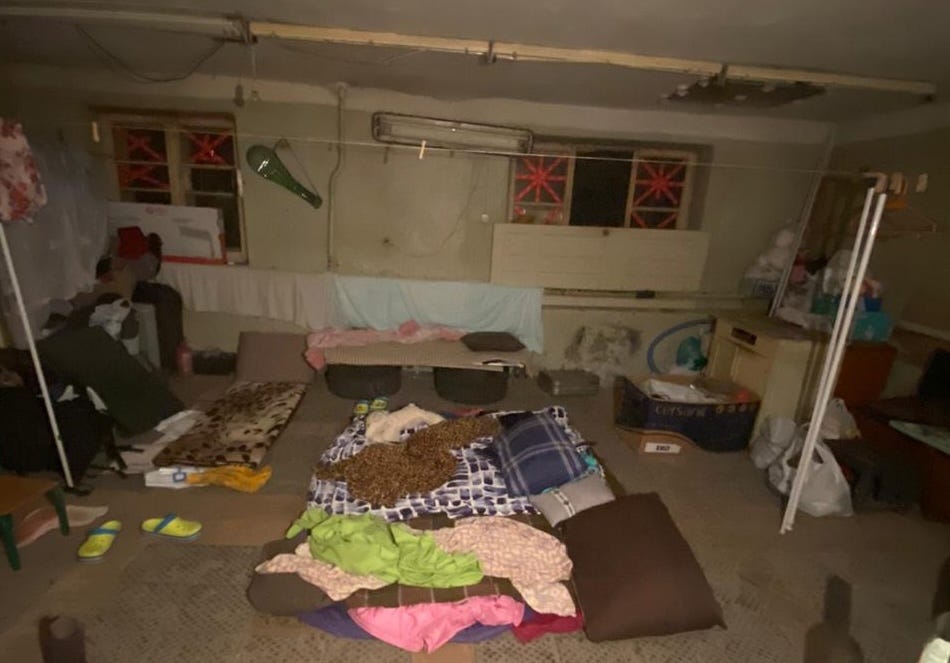
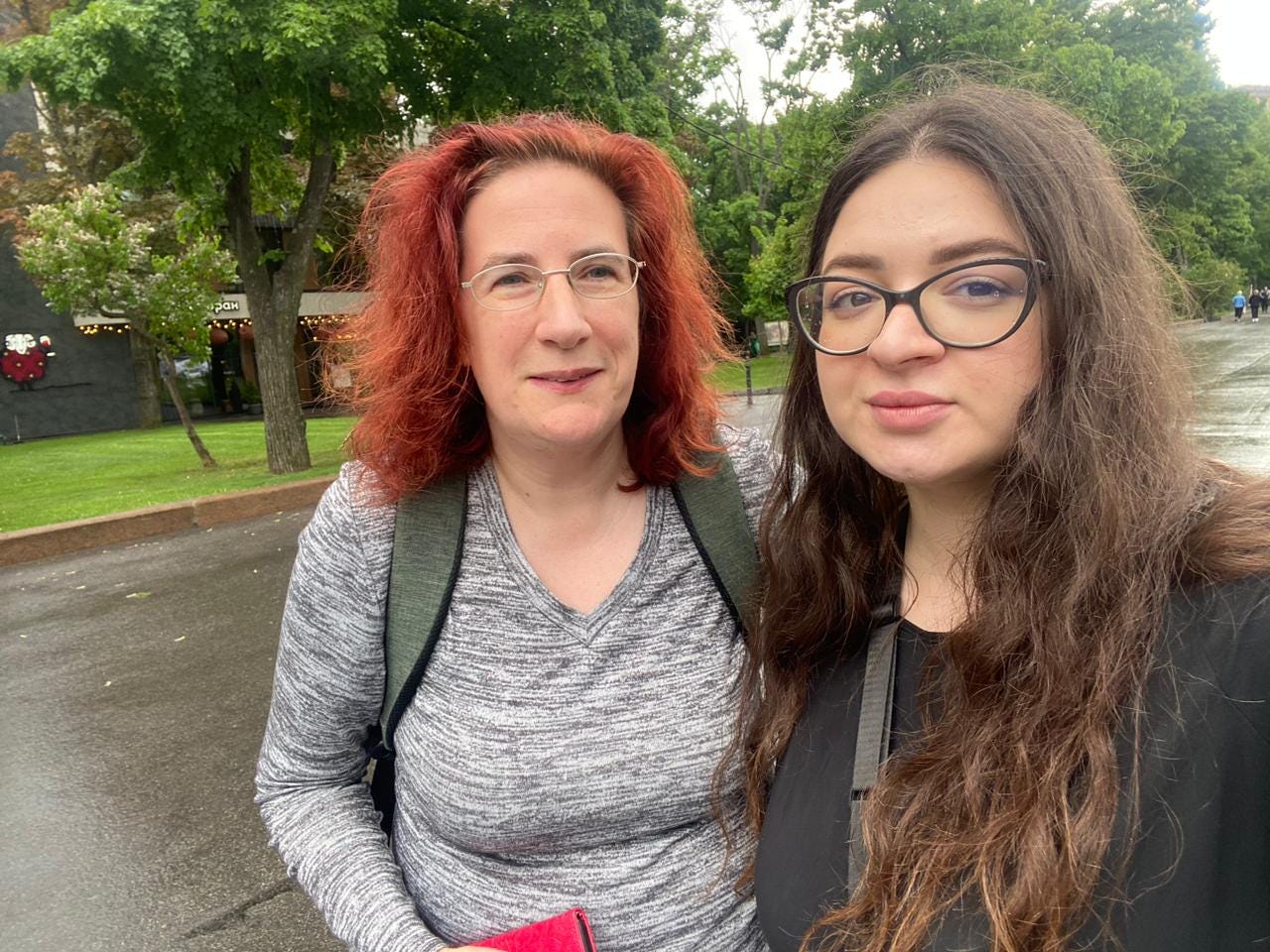

Anna, these posts of yours are eye-opening. I get to know what being in a modern war means through a source much more trustworthy and matter-of-fact than any news reportage. These are the sort of writings history is made of. I only wish there was no need for them.